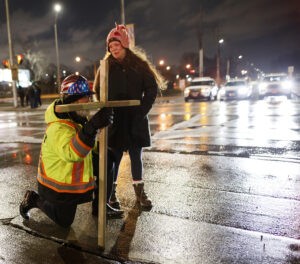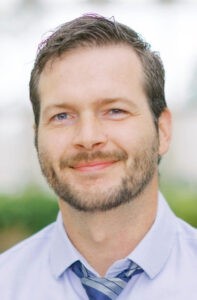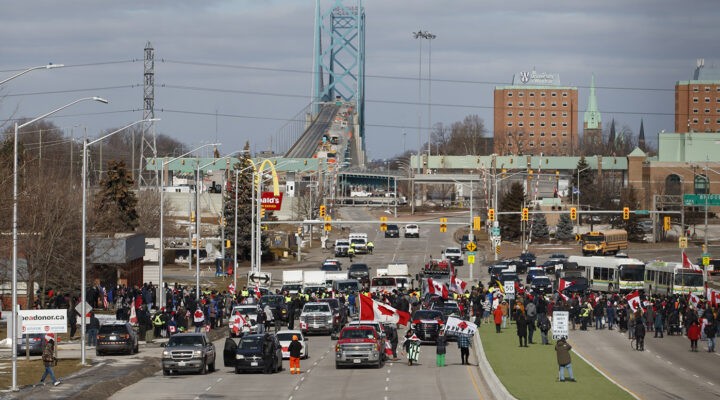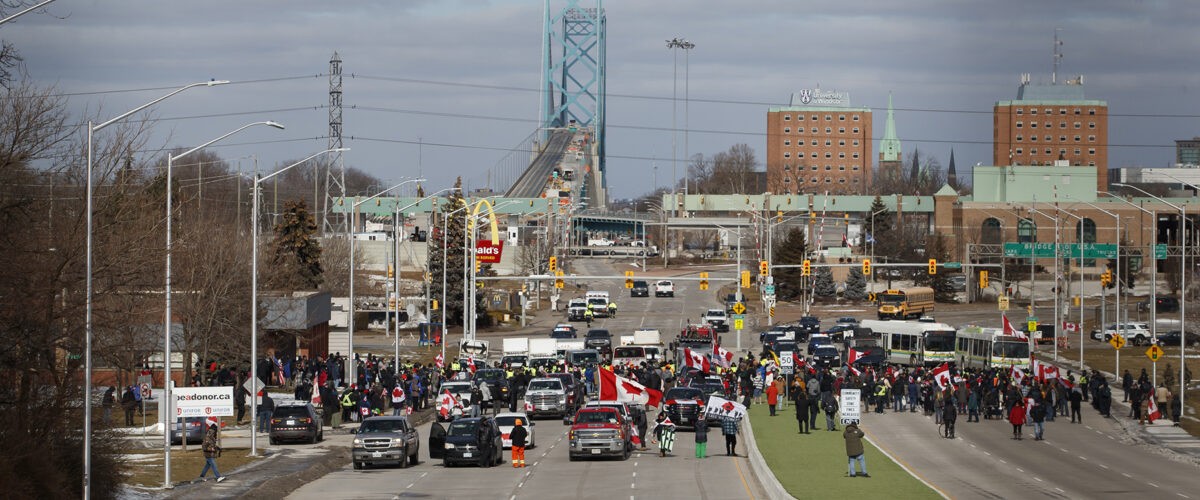As a Canadian, the only thing more disconcerting than watching American politics is watching Americans watching Canadian politics.
Prime Minister Justin Trudeau’s father, Pierre Elliot Trudeau, once said that America and Canada were like an elephant and a beaver sharing a bed. The beaver watches the elephant carefully, often in wonder and worry, but sometimes I think the elephant just turns and says to itself, “Oh, what a silly-looking squirrel!”
The recent truck convoy is a good example: Americans all of a sudden turn in interest to see what is happening with their neighbors in the Great White North. In conservative U.S. media, the convoys are being portrayed instrumentally to attempt to validate lax responses to the pandemic, and this portrait is fraught with problems.
Let me go through a few of the misconceptions:
Misconception one: It was about truckers

Protesters and supporters gather at a blockade at the foot of the Ambassador Bridge, sealing off the flow of commercial traffic over the bridge into Canada from Detroit, on Feb. 11, 2022, in Windsor, Canada. As a convoy of truckers and supporters continues to occupy Ottawa’s downtown, blockades and convoys have popped up around the country in support of the protest against Canada’s COVID-19 vaccine mandate for cross-border truckers. (Photo by Cole Burston/Getty Images)
While the impetus for this convoy may have been the issuing of vaccination mandates for truckers who cross the U.S.-Canada border regularly, it quickly became apparent this really had very little to do with truckers. For instance, about 120,000 certified truckers are part of the Canadian Trucking Association, but when the convoy moved through Toronto to Ottawa, the convoy was only about 450 vehicles. At the peak of the protests, there were about 1,100 vehicles in the downtown but only 230 trucks. The CTA has denounced the convoy and stated that 90% or more of its truckers are vaccinated and happily compliant. The trucker mandates are really only a tipping point; an opportunity seized as part of a much larger agenda.
Misconception two: The protesters represent all Canadians
Right-wing news outlets have stated accounts of 10,000 or 30,000 or even 50,000 truckers coming to this protest. This is a blatant fabrication. Ottawa police reported around 5,000 to 10,000 protesters on foot at the peak. That is not small, but it also is not large. For example, the marches for climate change action in Montreal of 2019 were easily 500,000 people.
Polls continually suggest that the prime minister is acting with the approval of a large majority of Canadians. By several polls, Trudeau has received more than a 60% approval on both vaccine mandates and for invoking the Emergencies Act to remove the blockades. While Trudeau is being painted as a tyrant for invoking emergency measures, think about what the protests mean for democracy.
Trudeau said he was doing these vaccine mandates in the last election, a snap election last year. He already had issued vaccine mandates for federal employees at the last election. Canada elected him with this as a central election issue. The majority supports this course.
Since the government can and does regulate border travel based on health and safety, the government is merely doing what it was elected to do. So, for a relatively small group of people to blockade the nation’s capital until the government caves because they disagree with what a democratically elected government is doing is tremendously troubling. This is an uprising of those who don’t like that they lost the popular vote fair and square. (By the way, no one has accused our elections of being tampered with either.)
Misconception three: The protests have been peaceful
The Ottawa protests did not erupt into mass violence. For this, we are all thankful. There has been consistent messaging from different leaders on being nonviolent. There were many who did not have any intention of picking fights.
However, violent rhetoric was espoused early on by some of the protest organizers. Many protesters sported white nationalist symbols like swastikas and signs with violent slogans on them. Police reports of harassment, vandalism and intimidation have been pervasive.
“Many protesters sported white nationalist symbols like swastikas and signs with violent slogans on them.”
The National War Memorial and the Terry Fox Memorial were desecrated, drawing the condemnation of the former Conservative party leader Erin O’Toole, a military veteran. Let’s be clear: Blockading an entire downtown of a nation’s capital, along with two important international borders (Coutts and Windsor) and calling this “peaceful” is really not the right word. It is coercive.
Most disconcerting is that the accompanying protest at the Coutts border in Alberta was not peaceful. A massive weapons cache was found in the blockade. In a surprise raid, 15 protesters were arrested who were conspiring to kill police officers.
I must pause here and draw attention to the odd fact that these individuals were called “protesters” and not “terrorists” by the media. I wonder if their skin color was a factor.
This fear was part of what drove Trudeau to invoke the Emergencies Act. There were ties between Alberta far-right groups and the protests in Ottawa, so the police were rightly cautious. When Ottawa police were overwhelmed, the Emergencies Act was invoked to bring in the specialties of the Royal Canadian Mounted Police.
Misconception four: The Emergencies Act is totalitarian rule
Canada used to have an act called the War Measures Act, which was invoked by Trudeau Sr. during the “FLQ Crisis,” which was a terrorist attack by a Quebec separatist fraction. It allowed people’s rights to be suspended under something like marshal law. This was revised and replaced with the Emergencies Act because of how invasive it could be.
The biggest difference between the two is that the former allows the government to suspend rights, the latter does not. The other is that the former could deploy the military domestically without qualification, where all domestic emergencies are explicitly handled by the RCMP, only international conflict emergencies calling for the military.
“Reports of police brutality are fabrications. The police have been firm but also extremely careful.”
The Emergencies Act essentially allows the federal government to assume provincial and municipal jurisdictions, allowing the government to act quickly in a state of emergency. That’s it, and it can only do so for a limited time, placed under parameters by other branches of the federal government (including a vote of parliament, which was successful).
Trudeau invoked it because Ottawa police forces were too thin to remove the blockades. Reports of police brutality are fabrications. The police have been firm but also extremely careful. Despite conservative media reports, this is simply not the rise of a tyrant or a police state. Given the kinds of excuses made for the actions of Donald Trump in the American election, the rhetoric used to describe Canada’s prime minister by the far-right is political spin at is most hypocritical.
Misconception five: It is about the wrong things Trudeau has done
Trudeau makes the perfect scapegoat: He comes off as entitled and elitist like many liberals, generating a kind of blue-collar outrage. He uses dismissive rhetoric that has not gone well for him. However, far-right social media says virtually nothing about conservative provincial leaders like Premiers Jason Kenny in Alberta, Doug Ford in Ontario, or Tim Houston in Nova Scotia.
Kenny and Ford have fined and jailed fundamentalist pastors, not Trudeau. Houston has actually been the most heavy-handed of any Canadian leader with protests, removing trucks even before they came near the downtown. It is the government of Quebec that has gone so far as to issue fines for not being vaccinated (an action I suspect will get overturned in court).
Trudeau is often a gaff-prone politician, but his track record for the pandemic has been one of steady reassurance, cooperating with provincial governments. So, this really is not about his failures at all. This became apparent to me when the convoy’s goals were laid out. Their demands included appeals to the Canadian Senate to act (which was not even in session) and to the governor-general to dissolve the government and form a new one (not really within that office’s power to do). It became obvious that there was no way this protest was leaving except with force. We all knew this. You cannot blockade a downtown without end and not expect to be removed by police.
“Trudeau is often a gaff-prone politician, but his track record for the pandemic has been one of steady reassurance, cooperating with provincial governments.”
So, the real question is, what were they trying to accomplish? I think this was to commit a culturally engineered act of sedition to drain support of the current federal government, an action that massively favors political groups like the western separatist party (called the Maverick Party) and the new libertarian party of Canada (called the People’s Party of Canada), both of which have failed to win seats in the House of Commons in previous elections.
The protests made Trudeau look weak for being resolute while Ottawa police fumbled and were now tyrannical for acting with the Emergencies Act. However, the protests are the equivalent of someone sitting on another person, then crying violence when they push the person off.
So, what have the convoy, blockades, and protests been about? There are four overlapping truths here:
The protests are a sign of general unrest, channelled unproductively. People are tired and frustrated with COVID restrictions. It was appropriate to have a weekend protest by those who feel the restrictions have been too heavy and have disrupted people’s livelihoods. There is room for conversation there, but I would also say the best process for political change in the Canadian system is lobbying and writing local members of parliament (or voting differently in the next election).
No politician wants to see the economy suffer, but to see both federal liberals and provincial conservatives act in unison suggests they really do think this pandemic is serious. Thus, to blockade the nation’s capital at no end is not a productive means of protest. Instead of having a healthy conversation about the nature of these restrictions and about improving our social services to help those who are financially vulnerable, a coming together of people who know we are all in this terrible and tough situation together, this unrest looked for an enemy.
This protest is founded on vaccine misinformation. Protesters are generally convinced that vaccines are dangerous and useless. This is misinformation. Canada public health has published daily all known findings of negative reactions to vaccines. There are some, but negative reactions of any severity to vaccines (0.010%) are many times less frequent than the risk of death to COVID (which pre-Omicron was about 1% in Canada), let alone the terrible effects of long COVID.
It is correct to say that the vaccines are less effective against Omicron than other variants, which does warrant discussion on just how effective mandates will be going forward. It is not accurate to say that vaccines are therefore useless. They still consistently prove to be effective at reducing severe symptoms. The irony for all this is that the only reason some are protesting the effectiveness of vaccination mandates at this stage is that, frankly, vaccination has worked so well in earlier stages.
“Canada’s strong vaccination rate has allowed its economy to fair quite well in the pandemic.”
Canada’s strong vaccination rate has allowed its economy to fair quite well in the pandemic. Nova Scotia, where I live, which has had the tightest COVID restrictions and strongest vaccination rate, has seen the strongest economic growth in the country due to the stability these conditions made possible. Nova Scotia also has seen a total death toll this entire pandemic of 190 for a province of about a million people (compare that to similar-sized areas that did not use tight restrictions and have seen death tolls in the thousands).
Now, as restrictions lift, Nova Scotians can look back at their resolution to keep people safe and be proud.
The protests are a cover for far-right activity. While the average protester probably has no affinity with things like white nationalism, the leaders of this protest do and have been strategic in creating a sympathetic opportunity for support. This sounds like a conspiracy theory, but the statements of the organizers of the protests say it.
Pat King, the central leader of the protests, is a white supremacist who has talked about the purity of the Anglo-Saxon bloodlines and the need to protect this in Canada. He also has warned that Trudeau will “catch a bullet one day.”
James Bauder, the protest’s other main leader, spouts anti-Semitic conspiracy theories and wants the government to dissolve.
Tamara Lich, the protest’s key fundraiser, desires Alberta and Saskatchewan to separate from Canada in order to preserve the power and money of the oil companies there against the government’s climate action plan. She has raised funds in part with American far-right groups that seek allies in Canada.
B.J. Ditcher, the unofficial vice president of the convoy, a Confederate flag-waving podcaster and trucker, has espoused white nationalist intentions and Islamophobia over his podcast.
These leaders have been incredibly diligent in forming a movement that mobilizes and radicalizes those who feel unrest. Any movement can have a few bad apples (comparisons to the Black Lives Matter protests are common). It is important to assess the views of the actual leaders of the protests, without which this protest would not be happening.
The protests have been fueled by Christian fundamentalism. Perhaps this is the most distressing facet. The vast majority of Christian churches have complied with health restrictions because they know the pandemic is serious, and they want to be good witnesses to their communities.
The Canadian Baptist conventions, for instance, have been univocal on encouraging churches to go above and beyond in health measures. However, a few churches and pastors have espoused a kind of rhetoric of persecution. Some Christians believe they have been called by God to protest and even be arrested by the government in order to help stop this supposed tyranny.
“Many of the far-right churches have been preaching the pandemic weirdly, both as a hoax and as a sign of the end times.”
Many of the far-right churches have been preaching the pandemic weirdly, both as a hoax and as a sign of the end times. With the government issuing gathering limits, some have taken this as a conspiracy of an atheist government trying to stamp out the church. I suspect a strong correlation between churches that are strongly creationist and those that are anti-vaccination as the kind of skepticism toward scientific consensus is a natural affinity.
Others have denied the government’s role in regulating health and safety as an infringement on the separation of church and state (despite previous compliance with things like fire and building codes). Given that the virus is indiscriminate toward people of faith, it seems that appeal to religious freedom from restrictions amounts to a kind of religious exceptionalism, even entitlement. Christian involvement in these protests is a strange cocktail of an uneven understanding of separation of church and state, a kind of Christian exceptionalism, biblical literalism and vaccine misinformation.
The result has been a profoundly tarnished witness. I got messages from people, “How can you have faith in God when Christians do things like this, thinking God told them?” Others have messaged me and simply said they feel like Christians are a bunch of people who think the rules don’t apply to them, and they don’t care if others get hurt as long as their churches stay open. Indeed, it is worthy of lament. There is a loss of words watching this kind of self-absorbed fanaticism unfold.
I wish people could see how the vast majority of Christians are not represented here, conservative and liberal, Catholic and Protestant. I wish people could see the countless pastors and chaplains who have painstakingly followed protocols to keep their congregations and communities safe. I wish people could see the pastors I know who have worked tirelessly to learn new computer skills to have online services and meetings, knowing that the church can meet virtually and still be the church. I wish people could see the Christians who spent this pandemic delivering food to shut-ins, checking in on vulnerable persons, always willing to sacrifice if it meant showing others God cares. I wish Christians who think the government is out to get them would see how the chief medical officer in Nova Scotia is a devout Christian and has listened and prayed with our pastors, working together to have some of the tightest restrictions in the world but also the least amount of unrest. I wish churches that feel this unrest, like they are going to decline in this pandemic, could see the churches that actually have grown in areas with the tightest restrictions because they have found new, creative ways of ministering in their communities and their communities have seen this. As the emergency measures have ended and restrictions are lifting in Canada, but talk of more protests happening in Toronto as well as in the US and around the world, Christians need to think about their convictions in all this.
Some are tempted to just give up on faith. To this, I can only say that discerning God’s voice and following it is a risky but worthwhile thing. I can’t be too judgmental, given how many times I have misheard what I thought God said to me. It is not easy or immediate, or infallible. God’s whispers of love and truth can so often be drowned out by the shouts of others.
“God’s voice can so easily be our own preferences echoing back to us in our souls.”
Or we obsess about our individualistic spirituality, what we think is true, what we want to be true, so much that we forget to listen to how God is speaking through science and others around us. God’s voice can so easily be our own preferences echoing back to us in our souls. All this reminds us just how human our faith is and always will be. We never stop relating to God as humans.
There is something deeply Christian about realizing this fallibility: The Bible records God’s people murdering the prophets in order to protect their idols. It is an important reminder that some of the people I know who have participated in these protests are kind and sincere believers who, frankly, as far as I can tell, have just gotten the facts and priorities wrong. I have learned it is incredibly easy for a good Christian to back their deep-seated idols with a Bible verse.
There are consequences to this: Aquinas once said that to be in error about the world will result in an error about God. That is really what the movement has been: This is a sincere and passionate search for liberty by many Christians founded on misinformation that results in the opposite of true liberty.

Spencer Boersma
Spencer Boersma serves as assistant professor of theology at Acadia Divinity College. He previously served as the pastor of First Baptist Church of Sudbury in Ontario, Canada. He lives in Kentville, Nova Scotia, with his wife and five boys. He regularly posts his sermon and thoughts at spencerboersma.com.


